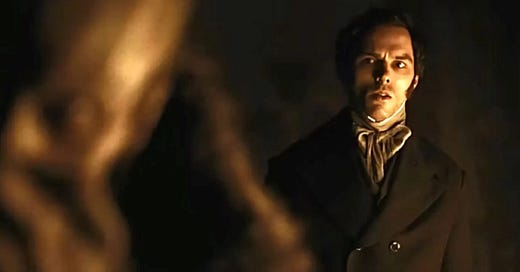“Does evil come from within us or from beyond?”
That line uttered by the central protagonist, Ellen Hutter (Lily-Rose Depp) serves as a thesis for the story line of Robert Eggers’ new remake of the classic vampire tale Nosferatu. Much like previous and future stories about vampirism, including the various adaptations of Bram Stoker’s Dracula, which the original Nosferatu film from 1922 by F.W. Murnau is based on, Eggers’ interpretation is an examination of the juxtaposition between monstrosity and desire that casts its own hypnotic spell.
The opening scene involving Ellen having a dream involving the titular vampire becomes the basis for Ellen’s entire story line. As much as Nosferatu (Bill Skarsgård), who’s also famously known as Count Orlok, who’s mostly hidden in the shadows during the sequence, frightens Ellen, she still utters for him to hear her call because she’s tempted by whatever sensation his presence gives her. As destructive as Count Orlok becomes to Ellen’s village, he serves as a simultaneous manifestation of Ellen’s encased deep sensual impulses furiously struggling to break free.
Bill Skarsgård and Nicholas Hoult as Count Orlok and Thomas Hutter in Robert Eggers’ “Nosferatu.” (Photo courtesy of Focus Features)
Such urges even take a hold of Ellen’s loving husband, Thomas (Nicholas Hoult). Once Thomas travels to the castle of Count Orlok to work out estate negotiations, he starts falling under the Count’s thrall himself. The balance of fear and burning curiosity Thomas experiences as the Count takes a hold of him shines through in Nicholas Hoult’s expressive eyes. While Hoult’s performance is one of effective internality, lead actress Lily-Rose Depp compliments him by playing Ellen with immense extrinsic abandon, using her full physical being to convey Ellen being a woman possessed, both literally and figuratively. Although Depp has proven herself a capable actress in films like A Faithful Man and Silent Night, in Nosferatu, she is an absolute revelation.
Meanwhile, the always-reliable Willem Dafoe steals the show as the eccentric Albin Eberhart Von Franz, a professor hunting on Orlok’s tail. Also, Aaron Taylor-Johnson does stellar work as Friedrich Harding, Thomas’ friend who, along with his wife Anna (Emma Corrin), watches after Ellen while Thomas departs on his trip. Although he’s dabbled into leading man roles, Taylor-Johnson’s work as the antagonistic Friedrich proves it’s supporting character roles where he’s at his best.
Lastly, there’s the actual antagonist himself: Bill Skarsgård as Count Orlok. While his impact on screen can partially be attributed to the makeup team who give his Count Orlok a more distinct look than past iterations, the ominous vocal work he does along with the manner he lurks onto each scene allows the character to mostly serve as his own creation.
The performances excel in a film that, thanks to Robert Eggers’ direction, has a similar fever dream feel as The Northman right down to the cinematography by Oscar-nominated DP Jarin Blaschke. Lush even when drenched in darkness, Blaschke’s camera work is stylized genius. A few scenes that highlight his cinematography involve Herr Knock (Simon McBurney), the Renfield of this Dracula story. During the scene where he hires Thomas to do business with Count Orlok, it is during the day with bleak gray coloring. In contrast, a scene afterwards where he’s scarily rejoicing in Thomas’ doomed venture in his dark basement is drenched in fiery colors as if he’s in a pit of Hell. Compared to Ellen and Thomas who’re at conflicting odds with the dark forces at hand, Herr Stock clearly embraces them and feels more at home within his own blazing underworld away from the banality of the gray surface.
Along with the cinematography, the score by Robin Carolan and the sound work allow Nosferatu to be a film that should be absorbed on the biggest, loudest screen possible to really put the audience under its trance. Hypnotic and immersive, Robert Eggers’ interpretation of Nosferatu demonstrates the daring temptation to submit to desire in order to yield to it in its own twisted way and is easily one of the year’s best movies. Safe to say between this and his three previous features, Robert Eggers is officially four-for-four with his filmography and I more than look forward to whatever the auteur does next.




